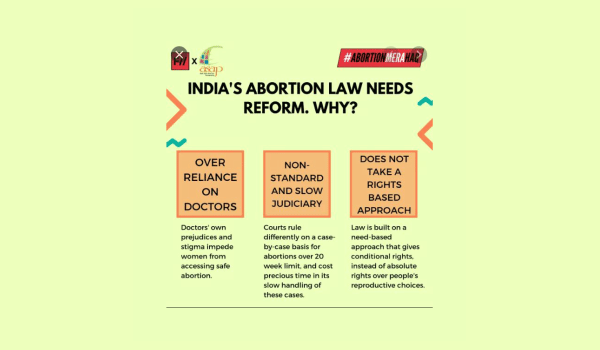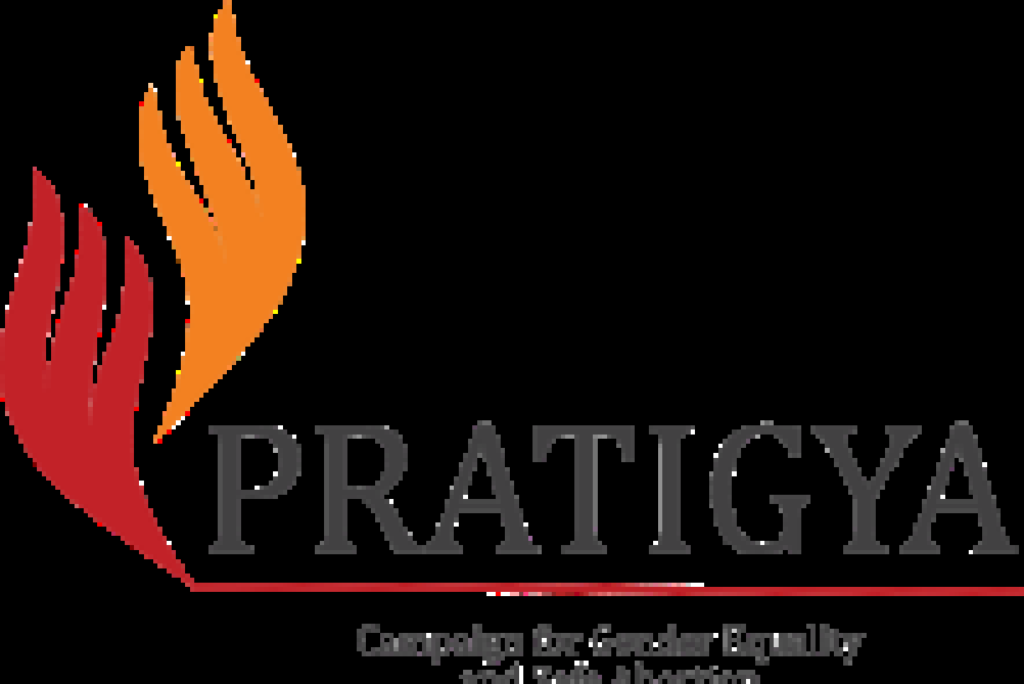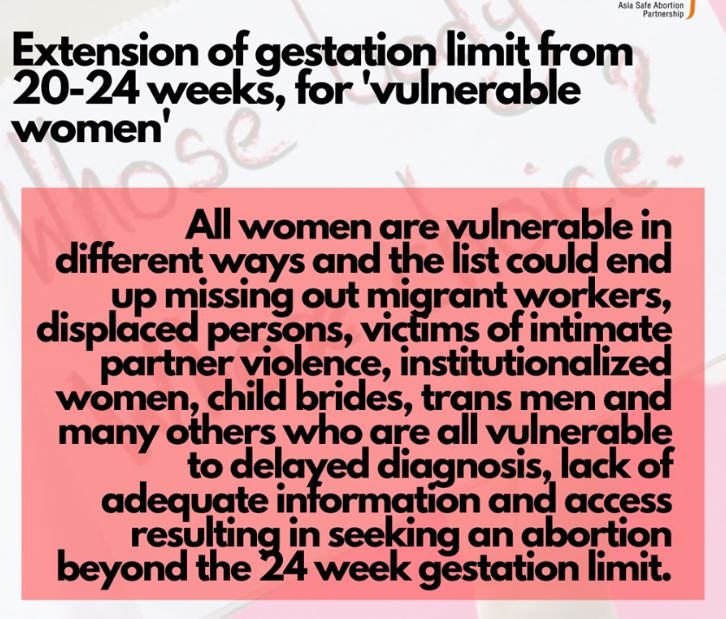
From: Feminism in India, 22 November 2018
On 29 January 2020, theCabinet of Prime Minister Modi published the text of a bill to amend theMedical Termination of Pregnancy Act, 1971. The bill is to be introduced in theensuing session of the Union Parliament, where it will be debated. A summary ofthe current law, the amendments it proposes, and responses to the bill byleading NGOs working for abortion rights in India are reported below. Text inquotes is taken direct from the source.
The Medical Termination of Pregnancy (MTP) Act 1971
The 1971 Act saysthat a pregnancy may be terminated up to 20 weeks of pregnancy with theapproval of one registered medical practitioner up to 12 weeks of pregnancy, orthe approval of “no less than two registered medical practitioners” from 12 to20 weeks of pregnancy. Approval must be given “in good faith” that:
“(i) the continuance of the pregnancy would involve a riskto the life of the pregnant woman or of grave injury physical or mental health,or
(ii) there is a substantial risk that if the child wereborn, it would suffer from such physical or mental abnormalities as to beseriously handicapped.”
If the pregnancy resultsfrom rape, or it occurs “as a result of failure of any device or methodused by any married woman or her husband for the purpose of limiting the numberof children”, the anguish caused “shall be presumed to constitute a graveinjury to the mental health of the pregnant woman” (and abortion is thereforelegal). In addition, account may be taken of “the pregnant woman’s actual orreasonable foreseeable environment”. Anyone under the age of 18 or “who is alunatic” requires the consent of a guardian. Otherwise, “no pregnancy shall beterminated except with the consent of the pregnant woman” (that is, no otherconsent except the woman’s is required). Terminations must take place in ahospital established or maintained by Government, or any other stipulatedapproved place. Finally, no legal proceedings may be taken against a medicalpractitioner who provides an abortion in good faith. The rest consists ofseveral pages of regulations.
The Cabinet’s justification for amending the law
“The Medical Termination of Pregnancy (Amendment) Bill 2020is for expanding access of women to safe and legal abortion services ontherapeutic, eugenic, humanitarian or social grounds. The proposed amendmentsinclude substitution of certain sub-sections, insertion of certain new clausesunder some sections in the [1971 Act], with a view to increase upper gestationlimit for termination of pregnancy under certain conditions and to strengthenaccess to comprehensive abortion care, under strict conditions, withoutcompromising service and quality of safe abortion.
“It is a step towards safety and well-being of the women andmany women will be benefitted by this. Recently several petitions were receivedby the Courts seeking permission for aborting pregnancies at a gestational agebeyond the present permissible limit on grounds of foetal abnormalities orpregnancies due to sexual violence faced by women. The proposed increase ingestational age will ensure dignity, autonomy, confidentiality and justice forwomen who need to terminate pregnancy.
“In order to increase access of women to safe abortionservices and taking into account the advances in medical technology, theMinistry of Health and Family Welfare proposed amendments after extensiveconsultation with various stake holders and several ministries.”
The amendments proposed
– The opinion of only oneprovider is required for termination of pregnancy up to 20 weeks.
– The opinion of twoproviders is required for termination of pregnancy of 20-24 weeks.
– Abortion would belegal from 20 to 24 weeks for “special categories of women”, including “vulnerablewomen” such as “survivors of rape, victims of incest and other vulnerable women(like differently-abled women, minors) etc”.
– The upper time limit of24 weeks would not apply in cases of “substantial foetal abnormalitiesdiagnosed by Medical Board”. “The composition, functions and other details ofMedical Board to be prescribed subsequently in Rules under the Act.”
– “Name and otherparticulars of a woman whose pregnancy has been terminated shall not berevealed except to a person authorised in any law for the time being in force.”
SOURCES: Medical Termination of Pregnancy Act 1971 ; Press InformationBureau Government of India, 29 January 2020
***********************************
RESPONSES FROMADVOCATES FOR SAFE ABORTION IN INDIA
Vinoj Manning, Ipas DevelopmentFoundation, Delhi, India
“Thecurrent set of proposed amendments is a welcome move but woefully short of thescope of the original draft amendments shared in the public domain in 2014.Notably missing is the expansion of first trimester abortion provision by nurses,auxiliary nurse midwives (ANMs), and doctors of the Indian system of medicine.That was the most significant provision which could have dramatically increasedaccess to safe abortion in the country.”
+++
Subha SriBalakrishnan, Rural Women’s Social EducationCentre(RUWSEC), Chennai, Tamil Nadu, India
“The proposed amendment is as of now only a bill that hasbeen approved by Cabinet for introduction in the next session of Parliament. Itwill come into effect only if it gets passed by both houses of Parliament. Withcontentious laws, this is not always a given. So I would wait till the billgets passed before saying anything about it.”
+++
Sangeeta Rege and Padma Bhate-Deosthali, Centre for Enquiryinto Health and Allied Themes, Mumbai, India
“There has been a lot of buzz onthe subject. This is our reading of the amendments at this stage:
– By allowing approval by oneprovider (MD Gynaec or MBBS trained as per MTP Act), access to abortion carewill improve. There is a need to also ensure safe methods of abortion,including access to medical abortion pills.
– Women and children accessing MTPbetween 20 and 24 weeks will no more require to go to the courts or bepresented before a medical board, as the decision will now be undertaken by 2 registeredmedical practitioners. This will prevent the rigmarole that they are currently subjectedto, as a decision will be taken at the level of the individual health facility.This is a welcome move – that there is a recognition of trauma caused due tounwanted pregnancies in situations of sexual abuse of children and adults, includinggirls and women who are differently-abled and have experienced sexual violence.
– Primacy has been given toconfidentiality of information related to women and girls accessing abortionservices, which is useful.
– The spirit of the recommendationsspeaks of comprehensive abortion services, as well as quality of care not to becompromised.
– Yet it seems that 24 weeks is anarbitrary gestational age. It is still not 3rd trimester abortion, that is,beyond 24 weeks*. There have been a spate of rape survivors, both women andchildren, with much higher gestational ages (3rd trimester) unable to accessMTP. Three cases of children as young as 10 years of age were forced tocontinue their pregnancies to full term in our recent experience.
– There is a need to demand privatesector accountability, as they tend to refer MTP cases to public hospitals,especially with rape survivors as these cases are not found to be lucrative.
– There is limited knowledge aboutthe safety of 3rd trimester abortion amongst providers, as well as the courts, despitea growing body of evidence on safe techniques and procedures to undertake it.The proposed amendments do not take this reality into account nor the lack oftraining of providers to conduct 3rd trimester abortions. This becomes abarrier.
– The Criminal Law (Amendment) Act 2013 and the Protection of Children from Sexual Offences Act 2012 guarantee the right to treatment of rapesurvivors. Abortion therefore needs to be seen as a right for all rapesurvivors – children and women – irrespective of the limits of the MTP Act.”
[*The thirdtrimester of pregnancy begins at 28 weeks- Editor]
+++

Pratigya Campaign’s statement on MTP ActAmendments approved by the Union Cabinet
Pratigya Campaignfor Gender Equality and Safe Abortion extends a cautious welcome to the governmentannouncement approving the long overdue amendments to the MTP Act, 1971. Whilewe welcome the government’s intention to bring about reforms in the now datedabortion law in India, the approved amendments have fallen short of the changesproposed in the draft MTP Amendment Bill notified in 2014….
Wewould urge the government to consider extending the gestational limit to allwomen seeking abortions up to 24 weeks. The advancement in medical technologyenables detection of some serious foetal abnormalities between 22-24 weeks;extending the gestational limit for all women will help them assess and decideon the outcomes of their pregnancy. We recognise that the proposed amendmentswill benefit vulnerable women (including survivors of rape/incest) to anextent. However, a larger number of women will benefit if gestational limit forspecial categories of women is removed entirely. There can be no greater harmto the mental and physical health and well-being of women, than carrying apregnancy arising out of rape/incest to term. Pratigya Campaign’s analysis ofcourt cases relating to abortion shows that 41% of rape survivors whoapproached the courts had exceeded 24 weeks gestation.
Wewelcome the decision to remove the requirement of opinion of two providers for12-20 weeks and would advocate that this decision be extended to 24 weeks,given the small number of specialists who are authorised to provide abortionservices beyond 12 weeks.
Itis commendable that the upper gestational limit for foetal abnormalities willbe removed, but it is disappointing that it requires women to seek approval ofmedical boards for substantial foetal abnormalities. Subjecting women to amedical board which will decide the cases is disrespectful towards theirdignity and rights. This also legitimises third party authorisation which isuncalled for and against the spirit of the original MTP Act, which leaves thedecision between the woman and her provider. In the past we have seen women andgirls seeking abortions face delays, stigma, and repeated invasive exams byunfamiliar doctors on judicially-established medical boards, which couldpresent a significant barrier to women needing timely service and care. Webelieve the opinion of the woman’s provider regarding substantial foetalabnormalities should be sufficient.
Theapproved amendments to the MTP Act will not be helpful to the vast majority of15.6 million women (an estimated 90% of whom access abortion care before 12weeks gestation in the country who seek induced abortion each year, and willhave negligible impact on reducing maternal mortality or morbidity due tounsafe abortion. To make transformative changes in access to safe abortion careand uphold “women’s reproductive rights over their bodies” we would urge thegovernment to take bold decisions to overhaul the MTP Act keeping the interestof women and their rights at the centre.
Specificallywe would urge to the government to consider the following:
– Extend gestation limits from 20-24 weeks forall women, not just ‘certain categories of women’
– Remove upper gestational limits for’vulnerable women’ (including survivors of rape, victims of incest and othervulnerable women (like differently-abled women, minors etc.)
– Drop the need for Medical Boards to decide incases of substantial foetal abnormalities and accept the opinion of the woman’sprovider
– Allow all women and not just married women toseek an abortion due to contraceptive failure
– Expand the provider base to include trained nurses,ANMs and AYUSH doctors to enable them provide abortions up to 12 weeks, in linewith WHO recommendation
– Make abortion a right and available onrequest at least for up to 12 weeks gestation
Mostof the above recommendations were arrived at by a series of stakeholderengagements that the Ministry of Health and Family Welfare had facilitated andwere included in the draft MTP Amendment Bill which was notified by theGovernment in 2014.
Weare yet to see the full text of the bill and urge the government to share itwidely with all stakeholders.
We would strongly urge the government to be bold in affirming itscommitment to women’s reproductive health and rights by making substantialamendments to the MTP Act.
FULL STATEMENT WITH REFERENCES: 6 February 2020
See also: Pratigya Campaign’sinfographics on MTP Act AmendmentsviaTwitter
+++

Facebook ASAP,30 January 2020
Suchitra Dalvie, AsiaSafe Abortion Partnership, Mumbai, India
“Many of us greeted the news with cautious optimism…. But onreading the details of the amendments proposed one is forced to wonder if thisis just fussing around over minor details while continuing to ignore the largerissues of women’s autonomy and agency? For these amendments to truly bringabout wide ranging change we must remember one crucial thing about true change– it happens only with a shift in power. Until the archaic patriarchal notionsof the need to criminalize various sexual and reproductive aspects of our lives(such as Section 377 in the Indian Penal Code) are done away with, anylegislation like the MTP Act, which is mainly meant to protect the doctors and notthe women involved, is not likely to result in genuine change….
If [expanding access of women to safe and legal abortion serviceson therapeutic, eugenic, humanitarian or social grounds]were truly the intent of the proposedamendments to expand access of women to safe abortion services then the BombayHigh Court as well as the Supreme Court Bench that deliberated on the Right toPrivacy have already articulated a far broader interpretation:
“Recognisinga woman’s prerogative to make decisions about her health and body, the benchruled that “there is no doubt that a woman’s right to make reproductive choicesis also a dimension of ‘personal liberty’ as guaranteed under Article 21. It isimportant to recognise that reproductive choices can be exercised to procreateas well as to abstain from procreating.” The judgment further states that “awoman’s freedom of choice whether to bear a child or abort her pregnancy areareas which fall in the realm of privacy.”….
“The phrasing “to strengthen access to comprehensive abortioncare, under strict conditions” hints at the fact that the underlyingattitude is that abortions need to be controlled somehow. One has to questionwhat makes an abortion such a different concern compared to say neurosurgery orcardiac surgery?…. There are laws which alreadyprovide for criminal punishments for grievous injury which would encompass anysuch surgery without consent or done with negligence or criminal intent. Whycan those similar laws not apply to abortions also and the decision ofproviding the service be left to the person who is pregnant and their doctor?…
“What we would need from a good lawis that it should ensure no woman is turned away or forced into an unsafeabortion or into continuing a pregnancy that is unwanted. These currentproposed amendments do not address that nor do they in any way hold the governmentand the public health sector facilities accountable for ensuring any of this.”
EXCERPTED FROM: TheASAP Blog, 30 January 2020
+++
FRHSIndia Statement on Union Cabinet’s announcement on MTP (Amendment) Bill 2020
While any change inlaw or policy that advances women’s health and rights is welcome, theamendments to the MTP Act approved by the cabinet seems to fall short of expectationsand needs, which various stakeholders have been advocating for many years.
There seems to be aconflicting report on the increase in gestational limit from 20 to 24 weeks.The reading of the Press Information Bureau’s statement dated 29th January2020 and the op-ed by a cabinet minister in a national daily today indicatethat this increase is only for ‘special categories of women (includingvulnerable women, survivors of rape, incest, differently abled women, minorsetc.)’ However, other media reports seem to suggest that the increase ingestation limits from 20 to 24 weeks is for all women. We hope this is correctand if it is, it would be a much bigger step in the right direction. FRHS Indiais not yet privy to the actual draft bill in its entirety and waits for thebill to be shared widely.
Theintention to address the needs of vulnerable women and those who want toterminate their pregnancy due to substantial fetal abnormalities iscommendable. However in order for these women to fully benefit from theintention, we would urge the government to consider the following:
1.Remove upper gestation limits for vulnerable women such that they are allowedto terminate at any point during the pregnancy as the trauma caused by sexualassault and resultant pregnancy can adversely impact her mental health andcompromise her right to life and liberty.
2.For substantial fetal abnormalities, the amendments propose constitutingmedical boards to decide the cases. FRHS India believes this decision should bebased on the opinion of the woman’s doctor alone. Subjecting women to undergorepeated medical assessments by an unfamiliar panel is disrespectful,humiliating and can also delay access to abortion care.
3.While we welcome the decision to remove the requirement of opinion of twoproviders for 12-20 weeks, we would like to urge that this decision be extendedto 24 weeks, given the small number of specialists who are authorised toprovide second trimester abortions in the country.
Theabove changes would translate the government’s intention to reality.
Theamendment in its current form (if what is mentioned in the PIB statement iscorrect) will address only a small, yet important part of the problem. Howeverit is unlikely to have significant impact on women’s access to safe abortioncare or reduction in maternal mortality and morbidity.
The amendments approved by the Cabinet address only a small but important section (less than one percent) of the estimated 15.6 million women who seek abortions annually in the country. There is enough evidence on the need to overhaul the MTP Act to make it contemporary and align it with advancements in medical technology. For the amendments to be truly progressive and address the needs of gender justice and reproductive rights we would urge the government to also address barriers over 14 million women who seek abortion within 12 weeks and 1.5 million between 12-20 weeks face in accessing abortion care. This would include progressive changes to the MTP Act to include issues like making abortion a woman’s right; expanding the provider base by allowing trained Nurses and AYUSH providers to offer abortion up to 12 weeks and for contraceptive failure to be grounds for women irrespective of their marital status. While the amendments approved by the cabinet is in the right direction, it is our hope that larger issues highlighted above will be also be incorporated in the final MTP (Amendment) Bill 2020 prioritizing women and their reproductive rights.
SOURCE: FRHSI statement, 31January 2020



